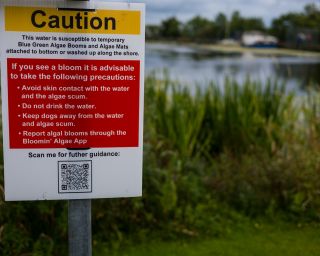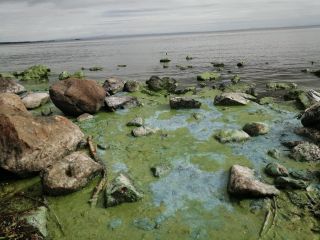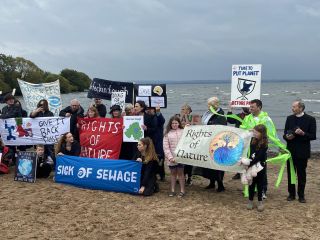Grief
Lough Neagh and Ecological Grief
Personal Perspective: A polluted lake impacts the mental health of communities.
Posted September 22, 2023 Reviewed by Tyler Woods

Lough Neagh is the largest freshwater lake in the United Kingdom and Ireland and is located in the six-county statelet of Northern Ireland. This small country of just under 2 million people currently has a non-functioning government due to ongoing cultural unrest connected with an unresolved legacy of colonialism, domestic terrorism, and divisive sectarian politics. The owner of the lake and the largest Commons on the island of Ireland is an earl who resides in England, and it is unclear how he manages and cares for the heavily polluted water source, which is the drinking supply for 40 percent of the population. The ongoing issue of how Lough Neagh is managed means that this environmental crisis has escalated, and nobody has taken responsibility for rectifying the matter, which has been referred to as a "public health emergency" and "an ecological crisis of biblical proportions."
It has been well documented for decades that the lough was being polluted and that the ecology of the lake and surrounding river systems was being harmed, however in recent months, and with the outbreak of green-blue algae, this ecological crisis has become a public health emergency with national and international media declaring the largest commons in Ireland to be “dying in plain sight.” This will invariably impact the local population and communities who live around the Lough and those who use it as their drinking water.
In recent years, the link between ecological health and public health has become more apparent, with coroners linking death to pollution in the case of Ella Kissi Debrah, who lived close to a motorway in England with dangerous levels of air pollution. There was also the first diagnosis of "climate change" in Canada as a result of the climate crisis. Diagnoses like this will become increasingly common as carbon levels increase along with global temperatures.

The Lough Neagh ecological emergency has impacted many: those who drink it, live near it, work on it, and the many groups and organisations who use it for recreational and well-being purposes. That number is estimated to be close to 1 million people, with the groups currently most visibly impacted being the fishing community and the open-water swimming community, which had to stop all group swims in the lake in June this year because people became ill and after reports of dogs dying after drinking the water.
Many of these people show signs of experiencing ecological grief, trauma, anxiety, and depression as a result of this catastrophe. These conditions are healthy, appropriate, and normal responses to environmental disasters and emergencies, although distressing to the individual. These experiences will often affect those who have a strong level of natural connection to the ecosystems.
The psychological trauma and stress responses to environmental damage may include psychological, emotional, and cognitive processes that can feel unpleasant, confusing, and concerning. People affected may experience anger, rage, despair, and regret. There can also be feelings of guilt, remorse, and shame for what could have been done and how things may have been different. The Kubler-Ross model of Grief will also apply to environmental disasters, as bargaining, denial, and eventually coming to a place of acceptance are necessary for each person to integrate the experience and take action to find wellness and health after a tragedy or disaster.
Grieving is not a linear process, nor is it timebound or measurable, however, it is an integral part of life. The grieving process becomes more problematic or troublesome when the death or loss is unexpected and traumatic; this is referred to as complex grief and is linked to suicide, abuse, and violence. The grieving process is complicated, as the loss is deemed unnatural and unnecessary and occurs as a result of human neglect and willful harm. This is the case for ecological grief because the harm has been caused by human means and could have been avoided.

My Ph.D. research looked at the relationship between mental health and natural experiences in a time of climate and ecological decline. I concluded that for many people impacted by environmental destruction, the most effective way to reclaim their health and wellness was to become an environmental activist, or land and water protector.
In Lough Neagh, we have seen many activist groups and initiatives emerge as a result of this crisis, and this is one of the positives that can come from any emergency. These community groups allow people to find connection through the tragedy and give them an opportunity to express their concerns and channel their energy into constructive activities and actions that benefit the environment, the community, and themselves.
It has been said that in all crises there is opportunity, and some of the best work and greatest ideas have come to fruition because of emergencies. Some therapists refer to turning pain into power. Ecological grief and ecological trauma are distressing experiences, but they can be the emotional and psychological responses that pre-empt effective and pro-environmental actions that can help the areas most impacted by climate and ecological breakdown. If people directly impacted by environmental disasters want to reclaim their mental health and wellness in times of grief, trauma, and despair, it is in personal and collective actions and activities that they will likely find the most comfort, healing, and reassurance. It is the coming together to create sustainable and meaningful collective and ecological change where we can see people have the opportunity to thrive and reclaim their health and wellness.
References
Slevin, A., Barry, J., Hill, T., Orr, J., O’Flynn, P., Sullivan, L. and McLernon, R., 2022. Local climate Praxis in practice: community climate action in Belfast. Addressing the Climate Crisis: Local action in theory and practice, pp.3-13.
TAYLOR, L., An Ecofeminist Critical Analysis of Work, Nature Experiences and Mental Health in the Capitalocene.




